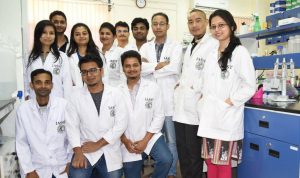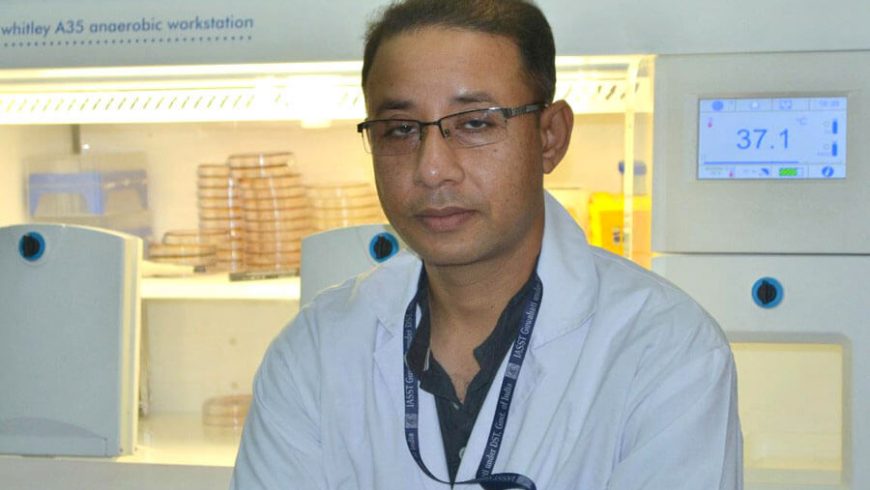[With the objective of encouraging the talented young scientists of the North Eastern Region who have brought glory to the region by receiving coveted awards/grants at the national level and to motivate the students to follow their path in their quest for excellence in research in the area of Biology and Biotechnology, this new section has been initiated. In every issue, we propose to bring to you the research highlights of one such scientist along with his/her brief biodata]
Mojibur R. Khan, PhD Associate Professor Life Sciences, IASST, Guwahati
I was born and brought up in a village called Nagabandha, located 12 km north of Morigaon town. After completion of my schooling at Nagabandha High School, I joined Cotton College for higher secondary classes and completed in the year 1994. I graduated from Assam Agricultural University (Jorhat) in the year 1999 with specialization in Plant Breeding and Genetics and also completed M.Sc. in Agricultural Biotechnology (2002). On receiving an offer from Prof. Fiona Doohan, I joined University College Dublin (UCD) (National University of Ireland) for PhD in the year 2002. I was awarded PhD on molecular plant-microbial interactions in 2006. I served UCD since then until 2011 as post-doctoral researcher and project manager, and was involved in research and teaching. On receiving Ramalingaswami re-entry fellowship from DBT to come back to India, I joined the Institute of Advanced Study in Science and Technology (IASST), Guwahati in 2011. Shortly after joining IASST, I was offered a permanent position. During my academic career, I received the following fellowships and awards-
-
Energy biosciences overseas fellowship (DBT, Govt. of India): declined
-
Postdoctoral fellowships from Department of Agriculture, Food and Fisheries (DAFF, Govt. of Ireland), Enterprise Ireland and Science Foundation, Ireland (SFI).
-
Presented the Best Student Oral Presentation Award by Society of Irish Plant Pathologists meeting, Ireland
-
DAFF fellowship during PhD.
-
Department of Biotechnology (DBT, Govt. of India) fellowship during M.Sc.
-
University merit scholarship during B.Sc.
-
State merit scholarship during higher secondary school.
Current research
My research on plant-microbial interactions has generated new interest in human-microbial interactions as many of the features are common in them. At the beginning of this decade, there has been a lot of research towards understanding the microbial inhabitants of our body called ‘Microbiome’ which is collectively trillions of bacteria of diverse nature, composition of which varies among individuals within and between communities. The initial inoculum is acquired maternally during birth and subsequent colonization of the gut depends upon diet, age, diseases, etc. Understanding the dynamic nature of the microbiome and its relation to physiology will lead to targeted modulation for better health. The north-east of India, the home to more than 200 tribes with diverse food habits, is ideal to undertake such studies. When I came back to India, I proposed a study on microbiomes of the various ethnicities of the north-east India and Department of Biotechnology, Govt. of India immediately funded the project. Faecal bacterial diversity was studied in fifteen tribal populations representing four geographic regions (Assam, Manipur, Sikkim and Telangana) by DGGE followed by NGS analysis on Illumina MiSeq platform. Geography and diet had significant effect on microbiome of the Indian tribes and was dominated by Prevotella. The effects were more prominent with lower taxonomic levels indicating probable functional redundancy of the core bacteria. A comparison with the worldwide data revealed that microbiomes of the Indian population were similar to the Mongolian population (Mongolia). The bacterial genera Faecalibacterium, Eubacterium, Clostridium, Blautia, Ruminococcus and Roseburia were found to be the core genera in the representative populations of the world. Our data for the first time showed the effect of ethnicity and geography on gut bacterial profile of Mongoloid and Proto-Australoid tribes of India. The results of our study had drawn worldwide attention.
Based on our previous results, DBT has funded another project under the Unit of excellence (U-Excel) scheme to understand the effect of traditional dietary habits of the various ethnicities of Assam on microbiome. Traditional rice beer is consumed by various ethnic groups in the north-east of India. The rice beer fermentation process involves use of a starter cake prepared using varieties of herbs those supply various amylolytic microbes, yeasts and lactic acid bacteria and also beneficial secondary metabolites into the drink. Research has been initiated to understand the microbial and metabolite profiles of the different varieties of rice beer and their probable effects on human microbiome and health. A population based study was conducted on three rice beer consuming ethnic groups (Mishing, Ahom and Bodo) to study the effect of rice beer on gut microbiome and human health. A total of 570 volunteers participated in the study which included both rice beer consumers (n = 474) and non-consumers (n = 96). Stool, blood and faecal samples of the volunteers are now being analysed to understand the role of rice beer on gut bacteria and health.
Our current focus is on understanding the role of gut bacteria on brain affecting our behaviour, popularly termed as ‘gut-brain axis’. Our group has established two well-equipped laboratories with facilities for studies on microbial interactions in human cells and in the model systems of Caenorhabditis elegans and Zebrafish.




